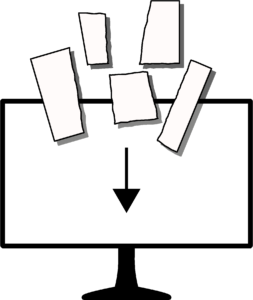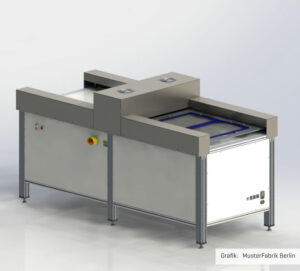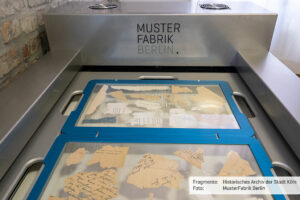
Our new automated 2-D scanning systems enable the digitization of fragile and historically valuable written materials as well as comparable objects in a way that is both gentle on the stock and suitable for the quantity involved. Depending on the application, digitization can be performed with native resolutions of 300 dpi to 1,200 dpi.
Double-Sided Capturing of the Scanned Material in one Scanning Pass
Our automated 2-D scanning systems capture the front and back of the scan object in a single scan pass. Both sides of the objects are automatically cropped with pixel accuracy during image acquisition. If required, transmitted light images can also be generated in addition to reflected light images.
Generating Accurate Digitized Objects
Our automated 2-D scanning systems meet the high requirements of digital image processing algorithms without restriction due to their true-color and true-geometry reproduction of the originals. Objects and fragments placed anywhere in the scan area are digitally captured with sufficiently minimal deviations in spatial resolution. This is an essential prerequisite for the successful use of complex methods of automatic pattern recognition, machine learning and artificial intelligence. These methods, which are often applied after digitization, can be used, for example, to visually prepare document content and make it readable again or to digitally reconstruct document fragments.
Stock-Preserving High-Volume Operation with High Image Quality
Our automated 2-D scanning systems are designed for time- and cost-efficient high-volume operation – without compromising on image quality. To achieve high scan throughput, our systems offer fast and controlled feeding of the scanned material to the high-performance acquisition unit so that it is utilized as much as possible in the overall process. The double-sided capture and automatic cropping of both sides of the object during image capture also has a direct positive effect on scan throughput in high-volume operation.
Digitization Workflow
The objects are placed in slides that are transparent on both sides before digitization. Depending on the application and device design, the slides have a usable area of about 30 to 60cm x 45cm. The slides are conveyed to the camera unit by a software-controlled automated transport system, where they are digitized on both sides at 300 to 1,200 dpi (native). Depending on the application, 1-channel transmitted light images of the front and back of the object can be captured in one scan pass in addition to 3-channel reflected light images.
Already during the acquisition, both sides of all digitized objects of one slide are cropped pixel-precisely. Depending on the application and the resolution, further processing of all digitized images of a slide is possible within 10 to 30 seconds after triggering the scan.
2-D Scanning System Fact Sheet (sample configuration)
Resolution: 300 dpi to 1,200 dpi (native)
Automatic conveyance of the scanned material by means of a slide carriage
Slides made of glass plates enclosed in frames for fragment placement
Alternative use of one large or two small slides
Scan area: 60 cm x 45 cm (large slide); 27 cm x 45 cm (small slide)
Scanning time: approx. 10-15 seconds (300 dpi); approx. 20-30 seconds (1,200 dpi)
L x W x H: approx. 200 cm x 100 cm x 100 cm
Video of the automated 2D scanning system
© MusterFabrik Berlin







